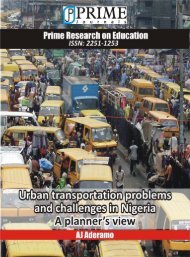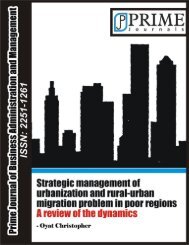See Full Article [pdf] - prime journals limited
See Full Article [pdf] - prime journals limited
See Full Article [pdf] - prime journals limited
Create successful ePaper yourself
Turn your PDF publications into a flip-book with our unique Google optimized e-Paper software.
Amini 302have been the reason why Gunawardena (1996) suggestedthat equivalent or more resources should beinvested in the Learner Support System if the DistanceEducation enterprise is to be successful.Dillon and Blanchard (1991) had listed and describedfour types of support systems:1). Learner support and learner needs2). Learner support and content3). Learner support related to the institutional content,4). Learner support and technology.Learner Support Services may be defined in variousways. According to Garrison and Baynton (1987), LearnerSupport Services are resources that learners canaccess in order to carry out the learning processes.Garrison (1989) also observed that in distance education,“support is concerned with a range of human and nonhumanresources to guide and facilitate the educationaltransaction”. These resources may include library facilities,various media, software programmes, students‟ financialself-sufficiency, counseling services, the teacher(facilitators inclusive), course materials, television, and soon. The list is not exhaustive depending on the angle onelooks at support services that aids distance learners intheir academic progression.According to Usun (2005), the dominant feature ofdistance education is the physical and often temporaldistance that separates the teacher and learner. Thismeans that distance learners are often placed in a uniquesituation in which neither teachers nor fellow students arephysically present (except in hybrid cases) to clarify,discuss, or provide feedback. This makes the provision ofeffective learner support system imperative in a distanceeducation model. Therefore, one important means ofanalyzing the effectiveness of the teaching-learning experiencein distance education system is through theanalysis of the learner support system. Hodgson (1986)had reasoned that support systems contribute to theprocess of a course as do the learning materials. He alsosuggested that support systems developed in recognitionof students needs help the distance learner becomecompetent and self-confident in learning, social interactionsand self-evaluations. He agrees with Rae (1989), in thatopinion. What would inform the present study is thatPrideaux (1989) had observed that the effectiveness ofthe student support systems of open/distance learninghas not been adequately evaluated.Students support services may take the following forms:- Record keeping and administration, pre-admissioncounseling- Admission and registration information-administrativeassistance.- Books dispatched by mail, library service, coursematerials.- Tutoring and counseling- Week end courses and study centres- Electronic communication technologies, such asphones, radio, audio tapes, video, television and so on.The amount of support services an institution offerslargely depends on that particular institution‟s capacityand resources at its disposal. These may be classifiedinto two:- Academic, including such packages as tutorial, advising,and counseling services.- Administrative functions, such as enrolment, admission,and registration and record keeping, information provisionand delivery of study materials (Molefi, 2002).Support services are also important from the emotionalperspective (Usun, 2005). Traditional students havemany physical clues of their attachment to the institution.Providing support services to the distance learningcommunity is an important part of creating the feeling ofbelonging for students who do not have access totraditional clues.An extensive and comprehensive learner support systemhas been established at NOUN and administeredthrough the Directorate of Learner Support ServicesDLSS (NOUN, 2008) – The main venues where studentsupport services take place are the over 40 study centrewhich are distributed all over the country. The humanresource of the Learner Support System in NOUN includethe Centre Directors, Administrative Officers, MultimediaPersonnel, Account Staffs, Stores Officers, the Institutionalfacilitators and student counselors.The Study Centre Director is the administrative head ofthe centre and represents the office of the Vice Chancellorat the Centre. The DLSS provide the followingsupport at the centre: Registration, Counseling, Libraryservices, distribution of course materials, course facilitation,multimedia services, orientation of students,information dissemination, matriculation of students,Assessment and Evaluation, e-examination and so on.The importance of the Learner Support System in NOUNcannot be overemphasized as the centres are the hub ofstudent activities in NOUN. The current study aims atevaluating students‟ perception of the services provided bythe Directorate of the Learner Services at NOUN.The National Open University of Nigeria (NOUN) has afunctional Directorate of Learner Support Services, sinceits establishment in 2003. Has there been an evaluation ofthe effectiveness or otherwise of the services of this unit asa very important unit of the University? Alterna-tively, whatare the students‟ opinions of learners support servicesrendered by this important unit to them? How do theyperceive these services? The problem of this research isthe resolution of these questions and others that maycome.Research QuestionsThe Study will try to proffer solutions to the followingquestions:- What are the perceptions of NOUN students on tutoring


![See Full Article [pdf] - prime journals limited](https://img.yumpu.com/42270022/3/500x640/see-full-article-pdf-prime-journals-limited.jpg)


![See Full Article [pdf] - prime journals limited](https://img.yumpu.com/49292987/1/190x245/see-full-article-pdf-prime-journals-limited.jpg?quality=85)



![See Full Article [pdf] - Prime Journals](https://img.yumpu.com/44526114/1/190x245/see-full-article-pdf-prime-journals.jpg?quality=85)



![See Full Article [pdf] - Prime Journals](https://img.yumpu.com/41607332/1/190x245/see-full-article-pdf-prime-journals.jpg?quality=85)
![See Full Article [pdf] - Prime Journals](https://img.yumpu.com/41231982/1/190x245/see-full-article-pdf-prime-journals.jpg?quality=85)

